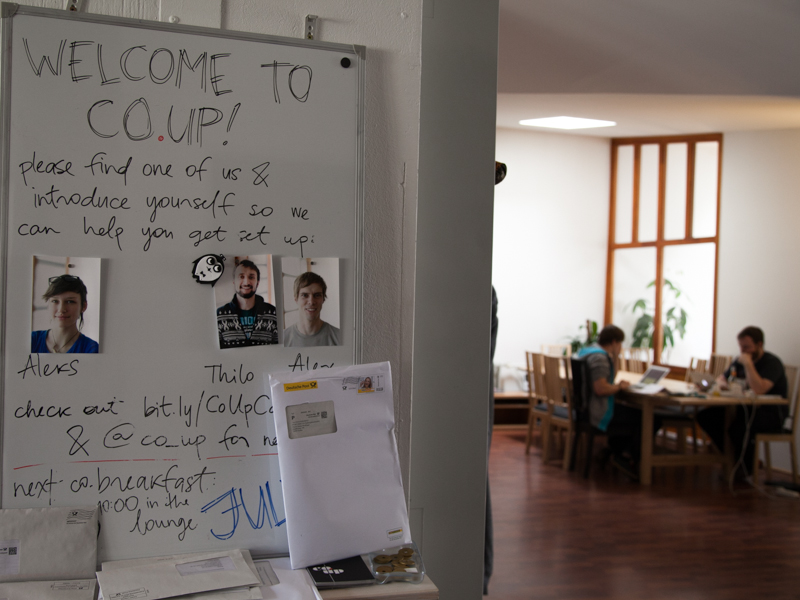All together now: Berlin's technology community embraces desk-sharing

It's a worldwide trend that's hard to ignore: "Desk-sharing," or "hot-desking" – where people work in a shared office for a flexible length of time – seems to be catching on everywhere.
In Berlin, technology-minded entrepreneurs and freelancers are finding that co-working is a good alternative to working in a fixed office, in that it meets their need for mobility and meshes with their worldviews. In nooks and crannies across the city, an increasing number of programmers, designers, and media creators sit behind their laptops together at a dizzying array of surfaces.
"I think it's a better way to work," said Thilo Utke, co-owner of Upstream, a Berlin-based software consultancy. In 2008, Utke and his colleagues got some desks and converted an extra room into a co-working space, where they could work with others.
"We felt like we wanted to hang out with people who shared our interests, and people who we could learn from," Utke said.
Specifically, Utke wanted to surround himself with people who programmed in Ruby, because "not many people did Ruby back then".
Since then, the space has moved and expanded. Now called co.up, it occupies two floors of what was previously a factory building in Kreuzberg, a trendy Berlin neighbourhood. At co.up, freelancers, entrepreneurs, and small businesses work side-by-side, sharing knowledge and working on projects together. The space also hosts a variety of technology-oriented events, such as a Javascript users group and the OpenTechSchool, which helps novices learn about programming.
Like at other co-working spaces, users at co.up can work on a desk in a shared space for a day, or buy part-time or full-time packages, depending on how often they plan on working. There are also meeting rooms and small offices available for more privacy or Skype calls.
Co.up is just one example of an array of co-working spaces in Berlin. According to Deskwanted, a web portal that allows those interested in co-working to find open desks at cities all over the world, there are over 130 options for those seeking a shared workspace in Berlin – more than the site lists in London or even San Francisco.
Most spaces have printers, Wi-Fi, and refreshments on hand, but each space also offers its own ambiance, and some even have specialized equipment catering to unique needs of co-workers. At Betahaus, for example, co-workers can make use of woodworking tools and even a 3D printer, while Nadelwald offers a variety of different sewing machines, for those who want to make clothes or other goods.
Carsten Foertsch, the managing director of Deskwanted, attributes the growth of co-working in Berlin to the city's vibrant creative scene and its relative affordability, factors that attract freelancers from around the country and even across borders. "What makes Berlin special is it's still kind of cheap to live here, at least compared to a city like London," he said.
"And Berlin has a big creative industry – you usually see many co-working spaces at hotspots of the creative industry."
Indeed, the growth of co-working spaces in Berlin goes hand-in-hand with a ballooning number of freelancers. A recent study by the Bundestag, the German Parliament, puts the current number of freelancers in the country at a record high: almost 1.2 million.
For freelancers, the networking and collaborative potential of co-working spaces can make them more ideal than working from home or at a coffee shop.
"Freelancers have to organise everything on their own, they need to look for clients on their own," Foertsch said. "And this is much easier if you are around people who are doing the same kind of thing. Co-working spaces are hubs for these networks."
Co.up's Thilo Utke said that co-working networks can create environments that are flatter than classical corporations, and that they can help freelancers pursue larger visions.
"Nobody who wants to work in a hierarchy comes here," Utke said. "When you look around there's a lot of freelancers who are looking to have bigger impacts, and they can be idealistic.
Shared today, gone tomorrow
Perhaps due to the highly-mobile nature of today's freelancers, co-working can sometimes be transitory.
For the past three years, Carsten Foertsch has conducted the Global Co-Working Survey, where he gleans insights about trends in desk-sharing. What he usually finds is that "at least a third of the people are not in a co-working space for more than a year", meaning that some move on, to other co-working spaces or to land full-time jobs, for example.
At co.up, Thilo Utke has noticed that recently, "a lot of people are coming from Spain to Berlin looking for work. And a co-working space is like a natural landing pad, because you can easily come here and work for a while and then actually find a job."
"And then you'd probably leave the co-working space."
